Much like the American best-selling author Dan Brown, the Indian writer Ashwin Sanghi doesn’t shy away from controversial topics – in fact, his thrillers depend on it.
His first, self-published English novel The Rozabal Line (2007) promoted the idea that Christ survived the crucifixion, while his upcoming book Sialkot Saga is steeped in the tumultuous 1947 partition of India and Pakistan.
The 46-year-old businessman-turned-author says the “tantalising possibility of an overlap between history and mythology provides an adrenalin rush”.
Last year, Sanghi collaborated with the American author James Patterson on the crime-fiction novel Private India: City on Fire, which sold 250,000 copies.
The author, who will discuss his work on Saturday, March 7, at the Emirates Airline Festival of Literature, told us why being described as the Indian Dan Brown is not always a favourable comparison.
What is it about mythology that makes it an intriguing source for thriller fiction?
Mythology per se does not inspire thrills. There is no thrill in Homer's Iliad, but the discovery of ruins in Turkey that could be ancient Troy makes the story exciting. In similar fashion, the idea of Krishna [a deity in Hindu mythology] as a mythological hero is interesting but not necessarily exciting. Couple that mythology with archaeological finds off the coast of Gujarat that could be Krishna's ancient city of Dwarka, and you have a thriller.
Were there any challenges in co-writing a novel with Patterson, given that most of the correspondence was through technology?
The collaboration with James was an extension of what I had already been doing, but with an entirely modern and contemporary backdrop. James provided me with a guideline as well as an existing set of characters that needed to be developed in the story. Working with him has been a refreshing experience. My focus has always been on research, while the Patterson formula is pace and plot. The book has given us a chance to combine our respective strengths.
You are often labelled the Indian Dan Brown. Is the comparison a unique selling point?
The Dan Brown tag has been both a bane and boon. It helped sales for the first novel, but also created expectations of a formulaic thriller in the minds of those who picked it up.
The end result was that those who did not care for Brown avoided the book, believing it to be just another thriller. Those who like him bought it expecting an Indian take on The Da Vinci Code, whereas what they got was rather different: a densely packed theological mystery.
The fact of the matter is that the stupendous success of The Da Vinci Code in 2003 sparked off an entire industry of theological thrillers and hence anything that was remotely connected to Jesus Christ, Mary Magdalene or the Sacred Feminine would be automatically lumped into that particular category.
I have no issue with debate, discussion and controversy surrounding a book but believe in Voltaire’s view: “I do not agree with what you have to say, but I’ll defend to the death your right to say it.”
Why do you think Indian fictional characters such as Feluda by Satyajit Ray do not have the timeless appeal that western detective characters enjoy?
The problem lay with the Indian publishing industry, which was unwilling to look beyond literary fiction. The West popped up so many great detective characters such as Miss Marple, Jack Frost, Nancy Drew, The Hardy Boys, Sherlock Holmes and Hercule Poirot. Alas, it was only Bengal that contributed two memorable characters: Feluda and Byomesh Bakshi. We now need lots more. It’s sad that we allowed ourselves to cede space to foreign authors in genres such as crime writing and detective fiction. I’m happy to see that this is changing rapidly now.
Was there a particularly funny review you’ve read of one of your books?
Oh, there are so many. For my novel, Chanakya's Chant, a newspaper critic said that my novel had the intellectual calibre of Winnie the Pooh. The truth is that Pooh is worth about US$5 billion [Dh18.36bn] in annual sales. I would say that Winnie the Pooh's intellectual calibre is far greater than that of most ordinary folks.
• Ashwin Sanghi will lead two events on Saturday, March 7: the panel discussion Is There Such Thing as an ‘’Indian’’ Novel? at 11.30am, and the talk Thrilling Private India at 3pm. Both events are at InterContinental Hotel, Dubai Festival City. Tickets, Dh70, are available at www.emirateslitfest.com
aahmed@thenational.ae






